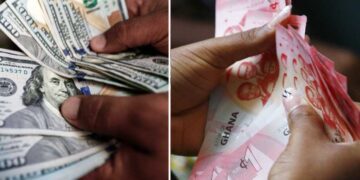The Ghana cedi is now the worst-performing currency among Africa’s top currencies just two months into 2022.
This is because it has depreciated by about 7.6% to the dollar from January 1, to February 25, 2022.
The local currency has overtaken the Zambian kwacha, which was the worst-performing currency on the continent two weeks ago.
Both Ghana and Zambia have challenges in addressing their escalating debts as well as struggling with revenue mobilisation and expenditure management.
This conundrum is impacting negatively on the country’s exchange rate, interest rate and inflation. Additionally, the recent downgrade of the country’s ability to borrow is also a major worry as investors are still unsure about the outlook of the Ghanaian economy.
This affirms some economists and analysts’ assertion that all concerns regarding the Electronic Transaction Levy must be addressed and passed immediately by Parliament.
If not the depreciating cedi will affect the budget of most corporate institutions as well as reduce the disposable income of consumers.
But there could be some hope going forward as the World Bank Group has approved a five-year Country Partnership Framework for Ghana from this year till 2026.
This will see the injection of $4.5 billion into the economy, in the next five years.
The CPF will support Ghana in its COVID-19 and medium-term development agenda. It is designed around three mutually reinforcing focus areas, namely: Enhancing Conditions for Private Sector Development and Quality Job Creation; Improving Inclusive Service Delivery, and Promoting Resilient and Sustainable Development.
Meanwhile, the Namibian dollar overtook the South African rand as the best performing currency in Africa so far this year with an appreciation of 4.12% to the dollar.
The South African rand is 2nd also with an appreciation of 3.68% to the dollar.


















